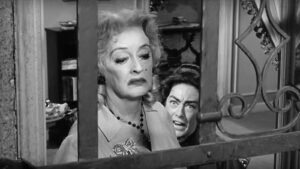
In the world of camp movie classics, few films hold such a beloved place in gay men’s hearts as Mommie Dearest (1981), the outrageous biopic about Joan Crawford’s abusive relationship with her adopted daughter, Christina. How many of us have not collapsed in fits of laughter, screaming “No wire hangers!”, or watched drag queens re-enact the iconic scene in gay bars around the world? Even Victoria Beckham paid homage to it in a hilariously self-deprecating music video while singing about going ‘crazy’.
Mommie Dearest was a huge success and quickly etched itself into our collective conscious – but for all the wrong reasons. Based on the bestselling book of the same name, it was meant to highlight child abuse from Christina’s point of view, investigate the complexity of Joan’s character, and serve as an Oscar-worthy prestige vehicle for its lead star, Faye Dunaway. The final result however was so over the top that instead of audiences gasping in horror or crying their eyes out they were rolling in the aisles with laughter, even bringing wire hangers to the cinema. The only ones looking on in horror were Christina and Faye – one seeing her trauma treated as a joke, the other watching her reputation go up in smoke.
How did a project with such serious intentions become so hysterically camp? An analysis by YouTube channel ‘Be Kind Rewind’ makes a number of interesting observations using Susan Sontag’s ‘Notes On Camp’ as a guide. As I watched it, I couldn’t help but draw parallels with the current trans movement. Like Mommie Dearest, it proposes itself as serious (“Trans rights are human rights!”), yet sets itself up for ridicule with the most ludicrous claims (“There is no such thing as biological sex”). Like Joan’s character in the film, Trans Rights Activists (TRAs) can appear narcissistic and in constant need of validation – to the point of being highly abusive (the violent protests at feminists meetings, the doxing, the rape and death threats). And like the film, they give us plenty of ‘wire hanger’ moments. Christopher/Tiffany Moore’s “It’s Ma’am!” outburst was an instant classic.
The idea of ‘accidental campness’ corrupting a film’s course into cinema history is one thing, but when it has the same effect on human rights activism the consequences are far more serious. This begs the question: is the trans movement at risk of ending up as the “Mommie Dearest” of civil rights? And as a consequence, will the standing of the wider LGBT+ community suffer a similar fate to Dunaway’s career, which never fully recovered? Seeking to understand the trans movement’s propensity for accidental camp is thus not about simply treating it as a curious and isolated phenomenon – it’s about damage control for all of us who care about our hard-won gay rights and precarious societal acceptance.
It’s important to differentiate the nature of “Mommie Dearest-style camp” from other types of camp. Camp in itself is not problematic – in fact it can bring an enormous amount of generosity, vulnerability and heart to a film, like The Bird Cage (1996), Priscilla Queen Of The Desert (1994) and Muriel’s Wedding (1994). Other movies become camp classics through the sheer joy of revelling in their own silliness, like The Rocky Horror Picture Show (1975) or Death Becomes Her (1992). Mommie Dearest finds itself more in the same territory as What Ever Happened to Baby Jane (1962) and Sunset Boulevard (1950), whose storylines revolve around tragedy, delusions and unhinged behaviour. This is the domain of ‘crazed camp’, where we also find such characters as Miss Havisham from Great Expectations.
One of the reasons Mommie Dearest ricocheted straight into the heart of crazed camp is that took itself way too seriously, milking the drama as much as it could in almost every scene. We see this with the trans movement, too (“the suicides! the violence! the oppression!”). Both are exasperating to watch – one because of its relentlessly packed screenplay, the other because of its never-ending demands to be “affirmed”. Where does this intense need to be validated come from? The answer lies in something seemingly mundane but hugely significant: quotation marks.
Everybody knows the drag queen is a man, particularly the drag queen himself. This is where trans ideology is fundamentally different: it mistakes our subjective quotation-mark-versions of things as somehow being more authentic than the non-quotation-mark things they are based on. It reinterprets the style as the substance – literally.
Sontag observed the relevance of quotation marks when writing “Camp… is the love of things-being-what-they-are-not” and “Camp sees everything in quotation marks, not a lamp but a “lamp”, not a woman but a “woman”.” Camp, thus, is about style, performance and theatre, the love of playful exaggeration and subversion. You can easily spot this in a shiny flamingo table lamp or a towering drag queen covered in glitter and sequins with an oversized wig. I appreciate there is a bigger debate over how drag can throw women under the bus, but for now I’m focusing on how drag is not about appearing as a woman, but as a quotation-mark-version of one – a “woman”. Everybody knows the drag queen is a man, particularly the drag queen himself. This is where trans ideology is fundamentally different: it mistakes our subjective quotation-mark-versions of things as somehow being more authentic than the non-quotation-mark things they are based on. It reinterprets the style as the substance – literally.
It’s a strange kind of logic, if you can call it that; literal becomes “literal” and even trans becomes “trans”. Never mind the dismay of transsexuals for whom transitioning is a radical treatment for severe gender dysphoria, now you can be “trans” without dysphoria, or even without transitioning! It’s a free-for-all of trans identities, linguistically reflected with the addition of an asterisk: trans*. Not that there are any footnotes explaining anything (yet another example of how trans ideology turns everything on its head), of course not – trans is whatever you want it to be!
The purpose of all this is to create a utopia of personal freedom and self-determination where there are no constraints and nothing can be held against them. Words are unmoored from their definitions (who needs them!) and individual quotation-mark-versions reign supreme, while the human body becomes merely a fleshy jacket for medical refashioning. It’s an upside down world where men can be “literal” women, “lesbians” have penises, those giving birth are the “father”, so-called ‘misgendering’ is “literal violence”, and self-denial is celebrated as “authentic self”. A world where a forgotten Norma Desmond can lose herself in the idea she is still “the greatest star”, an aged Baby Jane can make a ”come back” with her childhood act, and Joan Crawford is adored as the “perfect mum” despite abusing her children.
The problem is that such a universe cannot be sustained in a world of objective reality constantly serving wake up calls. These must be fought. How? By demanding everyone shifts the quotation marks from the subjective to the objective and reality becomes “reality”. No more “lesbians” with penises, but lesbians with penises. Look at how Norma’s delusions of still being “Norma” are artificially kept alive by the character of Max, who keeps sending her the fake fan mail she so eagerly receives. It’s no coincidence he is her servant. We, too, are expected to serve and support the untruths, as unwitting extras in a deranged validation drama. The words are even scripted for us, just as Joan Crawford commanded her daughter to call her “Mommie Dearest”, a term of enslavement. Similarly, the coercion around pronouns is used to enslave us all to trans ideology. Surely when a woman is facing her attacker in court and the judge demands she uses she/her pronouns for the man who committed the assault we all need to rise up and point out the blooming obvious just like Baby Jane: “But you ARE Blanche, you ARE in that chair!”

What Ever Happened to Baby Jane?
In the trans universe such inconvenient truths are, of course, “transphobic”. No one should be able to pull the curtain back. The movement thus takes the exuberant self-confidence of the camp classic “I Am What I Am” and twists it into a desperately insecure “Affirm me at all cost”. References to biological sex must be removed from legislation and daily life, much like Joan Crawford’s OCD had her obsessively scrubbing her kitchen floor. The constant claims of ‘cis sexism’ and ‘cis oppression’ are reminiscent of how Miss Havisham perpetually wallows in victimhood, reminding everyone of her broken heart. The frequent histrionics echo Norma Desmond threatening to kill herself when she’s not being centred. This is no place for light-hearted campy fun; it is the accidental camp of the unhinged. It’s what happens when you are not rooted in reality. And it’s too much (no wonder #superstraight went viral with such glee).
The missed opportunity of Mommie Dearest is that the high-octane melodrama never offered us any breathing space to catch a glimpse of who Joan really was. All it offers us is a caricature; a one-dimensional “Joan” that is somehow embraced with great affection while the actual Joan goes unrecognised. Similarly, trans ideology collapses the material realities of man and woman into reductive “gender feels”, then latches on to them as sacrosanct truth. We don’t get to see the actual complexity of what’s driving trans-identification, because they don’t want us to see this – it would dispel the myth of trans. Instead, the term ‘gender dysphoria’ is offered as a simplistic catch-all “explanation”. Thankfully, more and more detransitioners are helping to give a much-needed human face to the complexity of “trans” – although at great cost to themselves.
The most important difference between the movie and the movement is, of course, that one plays out on the screen while the other plays out in real life – in universities (where female-only student groups are getting banned), in schools (where young kids are asked what ‘gender’ they might be), in sports (where males are competing and winning against females), in rape shelters (who lose funding if they are not “inclusive” enough), in prisons (where women get sexually assaulted by males allowed into the female estate), in legislation (where women’s rights are fast being eroded) and in the operating theatre (where 13-year-olds are having “gender affirming” double mastectomies).
As with the movie, gay men have come out in strong support of the trans movement. At first sight our shared trauma of being ‘the other’ might seem like a natural fit. I wonder if the accidental camp of the trans movement adds a further, perhaps subconscious magnetic pull for gay men – the inherent tragedy of a person believing to be what they are not, the bizarre yet captivating spectacle of a man in a bad wig suing a women’s beauty parlour for not wanting to wax ‘her’ balls.
Mommie Dearest has become a firm favourite with the gays, enjoyed as a rollicking camp ride where all eyes are firmly on “Joan”, not the story of child abuse. Why is that? A common thread for the movies I’ve mentioned here is the fear and pain of rejection. It’s a wound that resonates deeply with so many of us; our own ‘Velvet Rage’ as coined by therapist Alan Downs. There’s a perverse delight in watching a crazed “Joan” acting her rage out with wild abandon, something we encourage, even want to partake in. In fact, upon the film’s release, a number of New York drag queens dressed up as Crawford and kicked life-size effigies of Christina down the street – another example of style subsuming substance. Would they have done the same if Christina had been an effeminate boy who grew up to be gay, and Crawford an abusive man?
As with the movie, gay men have come out in strong support of the trans movement. At first sight our shared trauma of being ‘the other’ might seem like a natural fit. I wonder if the accidental camp of the trans movement adds a further, perhaps subconscious magnetic pull for gay men – the inherent tragedy of a person believing to be what they are not, the bizarre yet captivating spectacle of a man in a bad wig suing a women’s beauty parlour for not wanting to wax ‘her’ balls. And perhaps some of us see it as a logical extension of drag and don’t think any further. The danger is that this creates a blind spot that prevents gay men from looking deeper at what the trans movement revolves around: the denial of the material reality of our sex, the very basis of our homosexuality. Remember the quotation marks: in the trans world, sex is merely “sex” while gender rules. It’s deeply disappointing to me that organisations that once represented gay men and women have now submitted to trans ideology to the extent that they don’t even recognise homosexuality as same-sex attraction anymore. We are attracted to a person’s “gender” now, apparently.
The level of cognitive dissonance among gay men may be tragic, but what’s more heartbreaking is seeing them turn on their own with the intensity of an out-of-control Joan screaming “Christina, bring me the axe!” As the axe falls, gay men are kicked out of LGBT+ groups, a petition is started to de-platform the LGB Alliance, and a beloved gay magazine is run into the ground. Lost in the spectacle of the T, they happily cheerlead us into our own erasure, while kicking women’s rights down the street just like those drag queens did with their effigies in New York.
There is a scene in Mommie Dearest where we see a young Christina slumped against the bath after her mother had yet another hysterical fit. Covered in the cleaning powder Joan had maniacally thrown around the bathroom, Christina mutters an exasperated “Jesus Christ”. It’s a feeling we can all relate to as we witness the damage being done by the trans movement: the distortion of our language, the erosion of our sex-based rights, the curtailing of our freedom of speech, and the medical horrors befalling gender non-confirming youth under the header of “authenticity”. This is not a camp cult movie – it’s a cult.
It’s time to stand with the lesbians who have been raising the alarm for years, to shift the focus firmly back on that most fundamental aspect of what it is that makes us human in the first place. And that is our sex, not our “gender”.
Gay men – it’s time for our close-up.
Illustration by Eggen; her website is www.eggenland.com
You can visit MrMenno’s YouTube channel at https://www.youtube.com/channel/UCV3876CGo9uVUvoZuUZsMgg
MrMenno is on Patreon at https://www.patreon.com/BadGaySuperGay
We welcome contributors – of any viewpoint – who prefer insight to invective, who want to test ideas rather than dismiss them, and who’d rather build bridges than blow them up. If you want to write for us email editor@staging.lesbianandgaynews.com
























Corking. Hagsploitation. Love it.